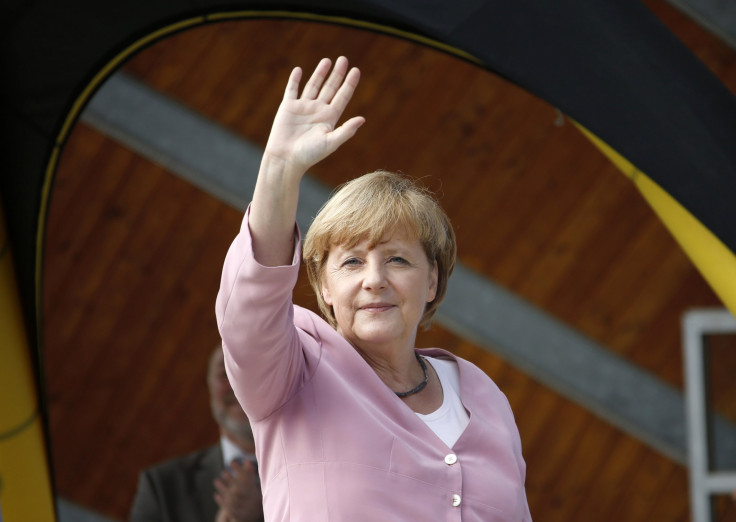Angela Merkel Coasting To Re-Election, But Social Democrats May Surprise Her

Correction: In an earlier version of this story, Christiane Lemke's name was erroneously spelled as the masculine "Christian".
She is the most powerful woman in the world, according to the latest annual poll by Forbes magazine. She has been at the helm of Europe’s biggest economy for eight years, presiding over growth while the rest of the European Union was mired in crisis. Now she is seeking a second re-election that would cement her role as one of her country’s longest-serving leaders, and accomplish something that few European heads of government have managed amid that euro crisis: remain in power.
On Sept. 22, German Chancellor Angela Merkel will know more about her political future. But with around two-thirds of the voters holding a favorable opinion of her, according to a poll by ARD-DeutschlandTrend, Merkel has never been in a better position. Even in 2005, when she won election for the first time, she was not that popular before the vote.
“Merkel has not made major mistakes,” said Christiane Lemke, Max Weber Chair in German and European Politics at New York University. “She is pragmatic and resourceful and she holds a very strong position in her party. She is in control of everything. Despite the fact that her party has not done well in state elections in 2011 and 2012, many Germans trust that she represents continuity.”
The 59-year-old leader of the center-right Christian Democratic Union party, born in the old East Germany, is the first woman ever elected as the head of a national German government, as well as the first Easterner to lead a reunified Germany. Now, she may even have a shot at challenging her party’s previous leader Helmut Kohl as the longest-serving chancellor of postwar Germany. He was in office for 16 years; she’s only been at the top for eight, but she has the stamina to last.
“Merkel learned the art of politics from Helmut Kohl and may be as persistent as he was in office,” said Lemke. “She plays the game of power very well.”
But beyond Germany’s borders, Merkel isn’t quite as popular. In countries suffering from the consequences of the economic crisis, such as Spain, Italy or Greece, many see her as the embodiment of German arrogance. Her tough negotiations on bailouts for indebted European Union members play well at home, but have resulted in scorn from those debtor nations. And over the years, Merkel has been an active supporter of the austerity plans implemented in southern European countries -- where people blame her for the resulting deep cuts in public services.
Even the president of the European Commission, José Manuel Barroso, who leads the executive arm of the European Unon, now says austerity has "reached its limits.”
That debate is playing a role in the campaign too, with her rivals quick to paint Merkel-backed austerity as ultimately bad for Germany too. “Austerity traps countries like Greece in a vicious circle; without growth they cannot escape from their budget deficits,” Peer Steinbrück, the Social Democrat (SPD) candidate for chancellor and Merkel’s direct opponent, told the Financial Times.
In Greece, only 10 percent of the population admires Merkel, compared with 35 percent in Italy and 40 percent in Spain, according to the Pew Research Center. But that does not matter to Germany as much as what the French think of her -- and there she remains popular, with around 70 percent of favorable opinions.
“France continues to be the major partner for Germany in Europe,” Lemke said. “Despite political differences between [President] François Hollande and Angela Merkel, the two leaders share an interest in a strong Europe.”
But it won’t be an easy time for Merkel, even if she wins her third election to chancellor in September. She may even have to stomach a coalition with the Social Democrats, the very people who don’t want Germany to continue championing financial austerity for Europe.
“She will most likely be re-elected,” said Lemke. “But she may have difficulties to form a government. There is greater party fragmentation in Germany than in previous elections. Her smaller coalition partner, the FDP (Free Democrats) may or may not receive enough support to enter parliament. As a result Merkel may have to form a coalition with the Social Democrats.”
In that case she may have to mend fences with them -- the SPD is furious at Merkel for stealing from them the idea of introducing rent controls, an issue that resonates with the 40 million Germans who rent their homes and are facing steep rises. That’s far from what one would expect from an ostensibly pro-business, free-market leader, but Merkel has shown that she is shrewd enough to go left when she thinks it would work.
“She is playing with the Germans,” Andrea Nahles, secretary-general of the SPD and chief election manager for the party, told the Financial Times. “I can understand her popularity, because she comes across as so down to earth. But as a politician she is simply not convincing. Deep inside, she is empty.”
Germans have about 45 days to make up their mind. But as always with a German election, the other Europeans are watching closely -- and this time with even more than usual at stake. Their national budgets may depend on whether the most powerful woman in the world gets re-elected, and by how much.
© Copyright IBTimes 2025. All rights reserved.





















